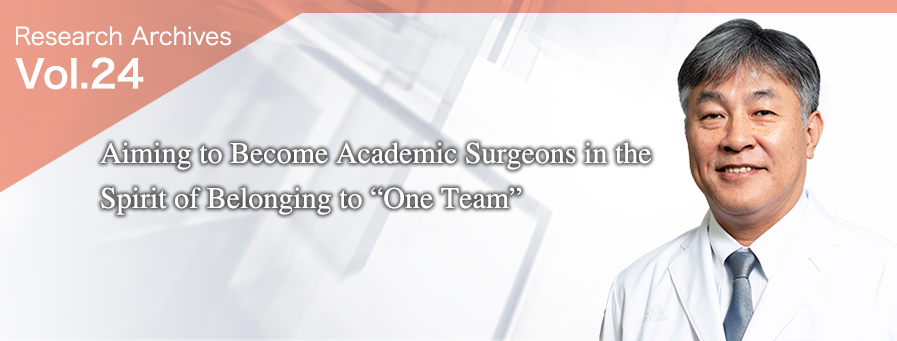
Department of Gastroenterological Surgery I, Graduate School of Medicine, Hokkaido University
Akinobu Taketomi, M.D., Ph.D.Surgery
- Education
-
- 1990
- Graduated from the School of Medicine, Kyushu University
- 1996
- Graduated from the Department of Surgery, Graduate School of Medical Sciences, Kyushu University
- Professional experience
-
- 1990.6
- Medical staff member, Kyushu University Hospital (Surgery II intern)
- 1990.10
- Intern, Fukuoka Children's Hospital & Medical Center for Infectious Diseases (Surgery)
- 1991.1
- Medical staff member, Kyushu University Hospital (Surgery II intern)
- 1991.4
- Intern, Hiroshima Red Cross Hospital & Atomic-bomb Survivors Hospital (Surgery)
- 1996.4
- Physician, National Hospital Organization's Kyushu Cancer Center (Department of Gastroenterology)
- 1998.9
- Researcher, Huntsman Cancer Institute, University of Utah (U.S.)
- 2001.4
- Chief Physician, Medical Treatment Department, Nakatsu Municipal Hospital
- 2003.6
- Assistant Professor, Kyushu University Hospital (Surgery II)
- 2011.4
- Associate Professor, Kyushu University Hospital (hepatology, spleen, portal vein and liver transplantation)
- 2011.11
- Professor, Department of Gastroenterological Surgery Ⅰ Hokkaido University Graduate School of Medicine
Bedside-to-bench research concept
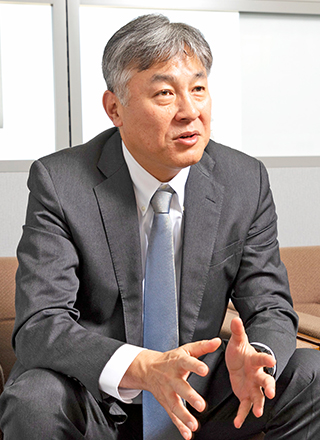 The members of the Hokkaido University Department of Gastroenterological Surgery I, under the leadership of Professor Akinobu Taketomi, have united to engage in medical care and research in gastroenterological surgery, including liver surgery, gastro-intestinal surgery, liver transplant surgery, and pediatric surgery, under the spirit of belonging to “One Team,” the slogan of Japan's national rugby team. Professor Taketomi himself played rugby at university, where he was a fullback, the last line of defense. He says, “You can't work solo in a surgery department. A rugby team consists of players with various physiques and roles. In the same way, members of our department have grown by sharing their experience and inspiring one another.”
The members of the Hokkaido University Department of Gastroenterological Surgery I, under the leadership of Professor Akinobu Taketomi, have united to engage in medical care and research in gastroenterological surgery, including liver surgery, gastro-intestinal surgery, liver transplant surgery, and pediatric surgery, under the spirit of belonging to “One Team,” the slogan of Japan's national rugby team. Professor Taketomi himself played rugby at university, where he was a fullback, the last line of defense. He says, “You can't work solo in a surgery department. A rugby team consists of players with various physiques and roles. In the same way, members of our department have grown by sharing their experience and inspiring one another.”
The Department of Gastroenterological Surgery I will celebrate its 100th anniversary in 2021. This long-established department has developed along with the Hokkaido Imperial University School of Medicine, which was founded in 1919 and was renamed the Hokkaido University School of Medicine in 1947. When Professor Taketomi was inaugurated as the seventh head of the department in 2011, he set goals: (1) for medical care, the goals of performing reliable surgeries and providing multidisciplinary treatment for advanced and intractable cases, (2) for research, the goals of conducting basic research based on a bedside-to-bench concept to elucidate molecular disease mechanisms and develop therapies, and of generating clinical evidence at high levels, and (3) for education, the goals of producing highly motivated surgeons who can contribute to the development of medical science. Members of the department have been giving their all to fulfill these goals.
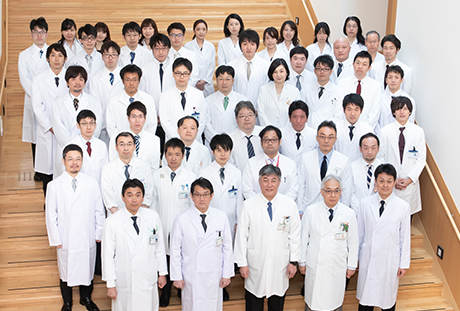
Currently, the department is promoting the latest evidence-based medical care and advanced research in partnership with more than 30 affiliated hospitals in Hokkaido, where more than 400 fellow doctors work. The department has been performing surgical procedures in increasing numbers. No other department in Hokkaido has performed more liver cancer and liver transplant surgeries. The number of colorectal cancer surgeries has nearly doubled since Professor Taketomi took the helm of the department, as a result of his efforts to increase the number of technicians certified for endoscopic surgeries, which are less invasive than conventional abdominal surgeries.
Professor Taketomi has embraced the bedside-to-bench concept, basing research (the bench) on clinical observations, while working to improve clinical techniques. He says, “It's also our duty to achieve better treatment outcomes and to help develop new therapies by addressing questions and challenges arising from clinical practice in our research. Given this background, the Department of Gastroenterological Surgery I has established a tissue bank of human tissue samples for research and has improved its research system. The bank keeps tissue obtained from liver cancer, colorectal cancer and other cancer patients post-surgery—tissue that is indispensable for research. The tissue samples are shared with other clinical groups and joint-research facilities throughout Japan, for the storage and management of clinical information and for in-depth studies on molecular pathology.”
Students must act on their own, requesting instruction from doctors and learning independently to produce research results
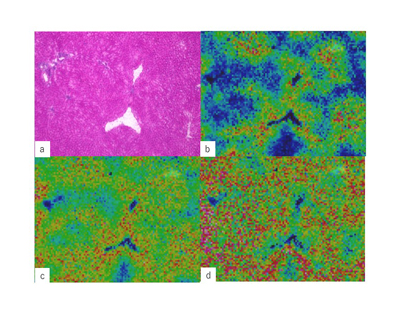
Graduate students in the department are currently engaged in advanced research toward clinical application based on studies by Professor Taketomi that are intended chiefly to elucidate the molecular mechanisms of hepatocellular carcinoma. For example, students are studying how to use the immunotherapeutic functions of inhibitors that block lipid-metabolizing enzyme activity involved in cancer cell growth to prevent relapses of hepatocellular carcinoma by activating an immune system weakened by cancer. Other research explores the possibility of molecular targeted treatments using unique fibroblasts in a tumor microenvironment that support cancer cell growth. R&D projects also include a project intended to elucidate the molecular mechanisms of ischemia-reperfusion injury (Fig. 1), which is often seen in organ transplants, and a project aimed to develop organ preservation solutions to maintain organ function, both in an effort to avoid ruining livers donated from brain-dead patients in a nation whose organ donation rate is significantly lower than those of other advanced nations of the world.
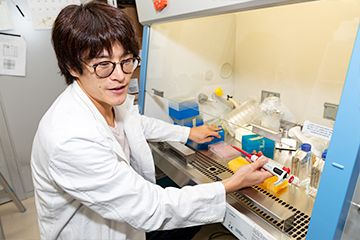
According to Professor Taketomi, the motto for the Department of Gastroenterological Surgery I is “Aim to become an academic surgeon” based on the teachings of Harvey Williams Cushing (1869-1939), a pioneering American surgeon who was the first person to describe Cushing's syndrome. Professor Taketomi adds, “Because we clinicians are also researchers, we must inspire in those around us the spirit of research. Of course, our overriding principle is to be persons of integrity who excel in surgical techniques and who are dedicated to research.”
The department's research section has two faculty members dedicated to research and three academic researchers, in addition to surgeons belonging to the clinical groups of hepatobiliary–pancreatic surgery, transplant surgery, gastrointestinal surgery and pediatric surgery. These researchers and surgeons provide graduate students with advice about research and experiments. One appealing aspect of the department is that, in this environment, young doctors in their sixth or seventh year after graduation can do the research they want to do in a field of their interest for three years. That being said, nothing is harder than being free, warns Professor Taketomi: “Doctors have no choice but to act on their own regardless of their own will in clinical settings, where surgeries and tests are performed on patients with ever-changing symptoms. While being free, graduate students should take the initiative, requesting instruction from doctors and learning independently in order to produce research results.”
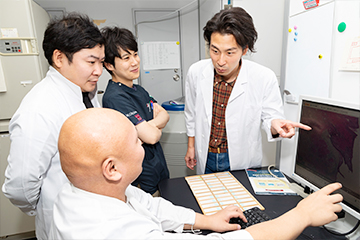
Professor Taketomi expects surgeons to stand on their own while also playing roles as members of “One Team.” He recommends that young surgeons go on to graduate school and study abroad, and he dispatches several young surgeons every year to the United States, the Netherlands and elsewhere. He maintains, “I want young surgeons to interact with students from various other countries in order to learn about those countries. It's important that they have a moment of introspection while struggling in a culture unlike their own.” In 2017, a young surgeon in the department joined the Japanese Antarctic Wintering Party to help its members maintain their health. He recently returned home after a year-and-a-half mission and resumed his clinical training. Professor Taketomi asked him to share his valuable experience in living under the most extreme conditions in the Antarctic.
(Interviewed in November 2019)
The Morning Seminar series hosted by graduate students provides opportunities to learn from other departments
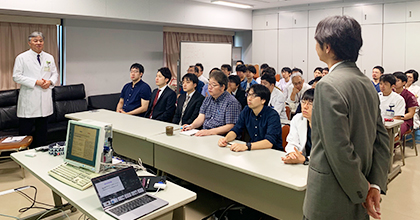
Graduate students in the department organize three or four Morning Seminar sessions every year, where a middle-ranking researcher invited from another school or department of Hokkaido University or from another university in Japan or elsewhere delivers a lecture. Since Professor Taketomi took charge of the department, 20 sessions have been held. To organize one, graduate students in the department directly contact a faculty member whose research area is close to theirs, such as one at the Hokkaido University Faculty of Science, Faculty of Engineering, Faculty of Veterinary Medicine or Institute for Genetic Medicine, to ask the faculty member to share, in an early-morning class, his or her enthusiasm about his or her research. Professor Taketomi says, “One of the unique appeals of Hokkaido University is its concentration of all research fields on a single campus, and it would be remiss not to take advantage of this blessed environment. Morning Seminar sessions give graduate students a significant advantage because they often provide an opportunity for joint research.”


